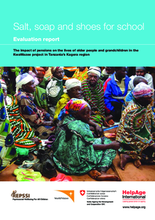Cash transfers have become an increasingly popular way of providing social protection in low-income African countries. While a number of evaluations have confirmed the benefits of conditional or unconditional transfers for vulnerable households, there is much less information about the impact of social pensions for older people and the combination with child benefits in older people headed households.
The KwaWazee pensions fund was started at the end of 2003 in rural Kagera in northwestern Tanzania, an area severely affected by the consequences of HIV and AIDS. By 2007 nearly 600 older people received a monthly pension of Tsh. 6,000 (an equivalent of US$ 5 in April 2008) and Tsh. 3’000 per child, if they are main carers. This study aimes to find out more about the impact of pensions and child benefits and what can be learnt from the experiences with this approach in the Kwa Wazee project.
Key Findings:
Older people and children affected by HIV and AIDS
- Older people who are already vulnerable to chronic poverty are placed further at risk by the consequences of HIV and AIDS such as the reduction in their family support networks.
- Older people have involuntarily become important actors in the crisis, caring for sick adult children and bringing up orphans and vulnerable children.
- All older people, whether they care for grandchildren or not, are severely at risk of being trapped in a spiral of poverty.
- In households where older people care for children, poverty directly impacts on the children’s nutrition, wellbeing and educational opportunities.
Impact of social pensions on older people and children
- Social pensions are an effective way of bringing more stability and dignity to the lives of older people. They significantly improve food security and the ability to meet basic needs, resulting in better hygiene, self-confidence and the increased ability to strengthen family support networks and reciprocal relationships.
- Pensions significantly improved recipients’ psychosocial wellbeing. Pensioners felt less worried about the future, less lonely, slept better and showed pride in the way they were coping.
- Regular pensions and child benefits lead to greater financial stability and better protection against crises such as illnesses or droughts. In difficult times, pensioners had to resort less to measures such as begging, day labour or selling assets.
- Children living in homes with a pension and child-benefits are better off than children in households without a pension leading to a considerable improvement in their psychosocial wellbeing: They are better satisfied after meals, have a more varied diet, and a better coverage of basic needs such as access to clothes, school materials, soap to wash and kerosene (for light to do homework), all of which are essential for school attendance and progress. They also have to do less hard work and have more time for themselves. Thus, better nutrition, better hygiene and better access to medication are likely to improve their general state of health.

